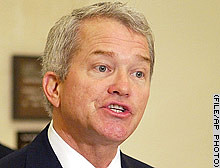I first learned of San Francisco Mayor Gavin Newsom's decision to hit his self-destruction button over at Recruiting Animal's blog and, as a political consultant, I have been itching to write about it ever since. Wow ... the difference a couple days can make.
Without a doubt, Newsom wants to apply the "celebrity spin" card in an attempt to save his political career, which, in my opinion, ended the day he said "I think the public in many cases finds it rather entertaining that suddenly they have someone who's still alive holding public office." Considering he said this in response to admitting an affair with the wife of a former top campaign aide, I guess he failed to appreciate that the people of San Francisco did not elect him to be entertaining.
In politics, there is one cliche that holds true: where there's smoke, there's fire. And sometimes, it's a real barn burner. Yesterday, Newsom attempted to spin the affair story away with the sudden realization he has a drinking problem.
No one was surprised, but many seem perplexed why Newsom would mount one scandal on another. After all, he had already come under fire as supervisor Jake McGoldrick called the mayor a “pathetic role model” who should resign. McGoldrick is not alone in his opinion, but Newsom seems to be gaining some sympathy from some very misguided people. And, in my opinion, supervisor Sophie Maxwell is at the front of this misguided pack.
“This is the mayor’s personal business and affairs,” says Maxwell. “If I look at what the mayor’s been doing on The City’s business I don’t see a reason to resign.”
What? Ms. Maxwell, with all due respect, an utter lack of judgement has everything to do with his ability to lead, and it goes well beyond making San Francisco a three-ring circus. Sure, the affair shows the shallowness of his character, driven by ego. Yes, the noted drinking problem demonstrates a man out of control, largely claiming to be unaccountable for his actions. But the real crime here is his handling of, well, everything.
After all, it is Newsom who made these personal problems the center of public attention during several press conferences. So please, spare me the idea that he is a victim. He is not and, even if he was, he is only a victim by his own hand, er, mouth, er, whatever.
If you want to meet a victim, check in with the campaign aide who will have to endure what experts say is 3-5 years of pain and suffering as he recovers (if he is lucky enough to recover) from this dual betrayal. Add to that additional exposure in a society much more sympathetic to women who are victimized by cheating spouses. Without a doubt, too many people assume the husband must have done something to alienate his wife. Maybe, maybe not.
The fact is that the only thing more appalling than Newsom's attempt to lampoon his unethical behavior is the utter idiocy of political consultant David Latterman's take on the situation.
“I can’t comment about whether he’s truly an alcoholic. There’s obviously been rumors about his drinking for quite a while,” he said. “But this is what celebrities do when they screw up, they go to rehab: Mel Gibson, Kramer, and now Gavin Newsom. It’s a tried and true public relations technique.”
Um, sorry, but Newsom has no celebrity status outside the context of his immoral, unethical behavior. Mayors are not celebrities and the public should not be expected to give elected officials (who are responsible for much more than a personal movie-making career) the same second chances they seem so willing to extend to actors, actresses, authors, and musicians.
While we have come to expect celebrities to enter rehabs and have affairs, I think we must appreciate that celebrities are different. Celebrities are not charged with governance of others. It does not impact the residents of San Francisco if Mel Gibson gets drunk. It does not damage them if Michael Richards needs anger management.
It does directly impact them if their mayor becomes the poster child for breaking personal and public trust on every level while claiming he is not responsible for his actions (the alcohol is). Further, it is deplorable that Newsom is so naive to think that you can create a media frenzy and claim that reporters are out of line in asking questions about his recent confessions. To think that he would be so arrogant to chastise an Examiner reporter who tried to ask a question by saying, “Could you possibly be respectful and could I close the door?”
It seems to me that question better belongs to his former campaign aide: “Could you possibly be respectful and leave my wife alone?”
As another Examiner article reveals: a political insider, who did not want to be named, called Newsom “thin-skinned” and said the reason why the mayor’s having a hard time with the press is because for the first several years of his tenure, “he had a relative love affair with the media.” And so goes the story of wannabe public figures who regret getting their wish.
Maybe someone should have told Newsom that getting at the truth and shaming the devil supersedes all relationships in the career of a reporter. Hmmm... it's kind of like a spouse I imagine. The love affair is great until something or someone changes the relationship. Imagine that. Except in this case, Mayor Newsom, you are solely responsible for your hurt feelings.
Funny. A few days ago, I might have been able to salvage this one. Today, I'd rather watch him spin himself to disaster.

Without a doubt, Newsom wants to apply the "celebrity spin" card in an attempt to save his political career, which, in my opinion, ended the day he said "I think the public in many cases finds it rather entertaining that suddenly they have someone who's still alive holding public office." Considering he said this in response to admitting an affair with the wife of a former top campaign aide, I guess he failed to appreciate that the people of San Francisco did not elect him to be entertaining.
In politics, there is one cliche that holds true: where there's smoke, there's fire. And sometimes, it's a real barn burner. Yesterday, Newsom attempted to spin the affair story away with the sudden realization he has a drinking problem.
No one was surprised, but many seem perplexed why Newsom would mount one scandal on another. After all, he had already come under fire as supervisor Jake McGoldrick called the mayor a “pathetic role model” who should resign. McGoldrick is not alone in his opinion, but Newsom seems to be gaining some sympathy from some very misguided people. And, in my opinion, supervisor Sophie Maxwell is at the front of this misguided pack.
“This is the mayor’s personal business and affairs,” says Maxwell. “If I look at what the mayor’s been doing on The City’s business I don’t see a reason to resign.”
What? Ms. Maxwell, with all due respect, an utter lack of judgement has everything to do with his ability to lead, and it goes well beyond making San Francisco a three-ring circus. Sure, the affair shows the shallowness of his character, driven by ego. Yes, the noted drinking problem demonstrates a man out of control, largely claiming to be unaccountable for his actions. But the real crime here is his handling of, well, everything.
After all, it is Newsom who made these personal problems the center of public attention during several press conferences. So please, spare me the idea that he is a victim. He is not and, even if he was, he is only a victim by his own hand, er, mouth, er, whatever.
If you want to meet a victim, check in with the campaign aide who will have to endure what experts say is 3-5 years of pain and suffering as he recovers (if he is lucky enough to recover) from this dual betrayal. Add to that additional exposure in a society much more sympathetic to women who are victimized by cheating spouses. Without a doubt, too many people assume the husband must have done something to alienate his wife. Maybe, maybe not.
The fact is that the only thing more appalling than Newsom's attempt to lampoon his unethical behavior is the utter idiocy of political consultant David Latterman's take on the situation.
“I can’t comment about whether he’s truly an alcoholic. There’s obviously been rumors about his drinking for quite a while,” he said. “But this is what celebrities do when they screw up, they go to rehab: Mel Gibson, Kramer, and now Gavin Newsom. It’s a tried and true public relations technique.”
Um, sorry, but Newsom has no celebrity status outside the context of his immoral, unethical behavior. Mayors are not celebrities and the public should not be expected to give elected officials (who are responsible for much more than a personal movie-making career) the same second chances they seem so willing to extend to actors, actresses, authors, and musicians.
While we have come to expect celebrities to enter rehabs and have affairs, I think we must appreciate that celebrities are different. Celebrities are not charged with governance of others. It does not impact the residents of San Francisco if Mel Gibson gets drunk. It does not damage them if Michael Richards needs anger management.
It does directly impact them if their mayor becomes the poster child for breaking personal and public trust on every level while claiming he is not responsible for his actions (the alcohol is). Further, it is deplorable that Newsom is so naive to think that you can create a media frenzy and claim that reporters are out of line in asking questions about his recent confessions. To think that he would be so arrogant to chastise an Examiner reporter who tried to ask a question by saying, “Could you possibly be respectful and could I close the door?”
It seems to me that question better belongs to his former campaign aide: “Could you possibly be respectful and leave my wife alone?”
As another Examiner article reveals: a political insider, who did not want to be named, called Newsom “thin-skinned” and said the reason why the mayor’s having a hard time with the press is because for the first several years of his tenure, “he had a relative love affair with the media.” And so goes the story of wannabe public figures who regret getting their wish.
Maybe someone should have told Newsom that getting at the truth and shaming the devil supersedes all relationships in the career of a reporter. Hmmm... it's kind of like a spouse I imagine. The love affair is great until something or someone changes the relationship. Imagine that. Except in this case, Mayor Newsom, you are solely responsible for your hurt feelings.
Funny. A few days ago, I might have been able to salvage this one. Today, I'd rather watch him spin himself to disaster.






















